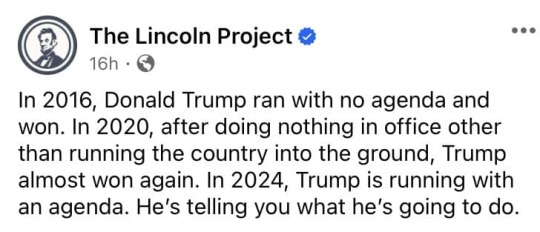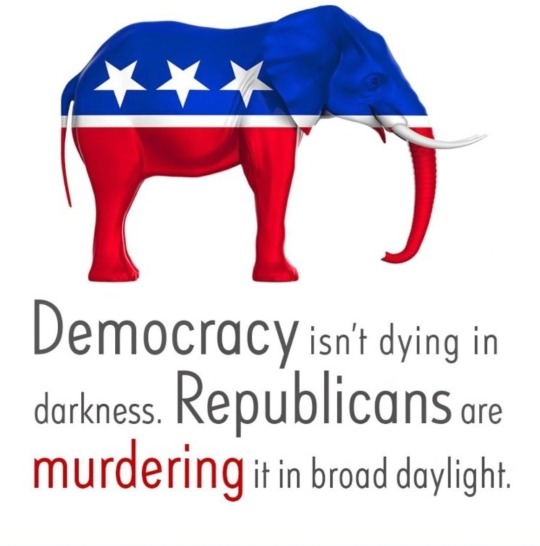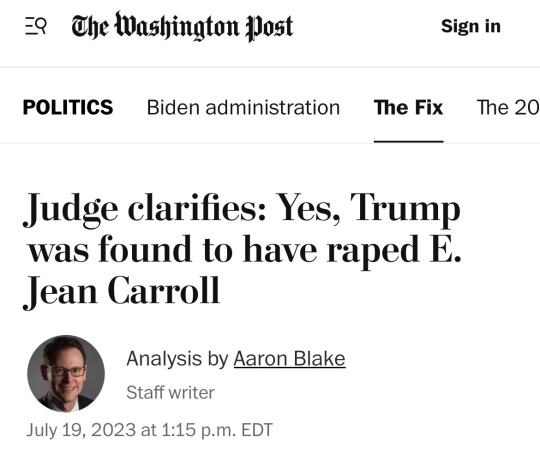#save our democracy
Text
Bob Costas is not holding back!
He is absolutely correct when he states:
“There is no cult of Biden”
Let’s let Jeff sum it up:

#donald trump#maga#criminal in chief#presidential election#vote blue#joe biden#save our democracy#fuck maga#trump indictment#trump is a threat to democracy#out of his mind#breaking it down#news#bob costas
1K notes
·
View notes
Text

It's interesting that he is releasing his own alliance for attack.
If you have allies like that, you don't need enemies.
mod
I assume the Chinese laughed their heads off and thought taiwan was ours as soon as the Orange Man was in power.
#stop putin#stop trump#stop violence#save our democracy#vote democrat#vote blue#please vote#no planet b#headdog#galelry mod#artwork#save our country#nato allies
65 notes
·
View notes
Text

Trump is planning to be a dictator. Believe him and vote democrat to stop him and save our democracy.
84 notes
·
View notes
Text

#democracy#please vote#go vote#fuck donald trump#vote 2024#get out the vote#vote blue#trump is a threat to democracy#vote democrat#save our democracy#us politics
33 notes
·
View notes
Text
I’ve Been Concerned About Book Banning.
I wrote the below as a template to write your representatives and Governors.
Dear (Insert Official Here),
I am writing to you today to express my concern about the importance of protecting books in public schools. As a citizen of this great state, I believe that it is essential for all students to have access to a wide range of books and resources that will help them learn about the world around them and develop critical thinking skills.
Unfortunately, in recent years, we have seen attempts by some individuals and organizations to ban certain books from schools and libraries. This is a worrying trend that threatens to limit the educational opportunities of our children and deny them access to important ideas and perspectives. The banning of books and other forms of censorship continue to be a danger to democracy and human rights today. When governments seek to control information and suppress dissenting voices, they undermine the principles of free speech, critical thinking, and open debate all of which are essential to a healthy democracy.
I urge you to take action to protect the rights of students to read and learn from a wide range of books. This may include supporting legislation that prohibits the banning of books in schools and libraries, or working to ensure that school districts have the resources they need to provide students with access to a diverse range of books and other learning materials.
I understand that there may be disagreements about what books are appropriate for children to read, and I believe that it is important for parents and educators to be involved in these discussions. However, I also believe that it is essential to uphold the fundamental principle of academic freedom, which holds that students should have access to a wide range of ideas and perspectives.
Thank you for your attention to this important matter. I hope that you will take action to protect the rights of students to read and learn from a diverse range of books.
Thanks for your time,
YOUR NAME
A Voter
7 notes
·
View notes
Text
Ok so 1953 was 70 years ago... 2053 is only 29 years away. This is my point the conservatives and Republicans in this country want to drag us all back 70 years ago if they had their way. I chose 1953 out of thin air, but pretty much any year of 50s. Because white men controlled everything back then. It's the 21st century for fuck sake, we're closer to 2053 now, are we all going to sit idly by allow them to this? Y'all realize we could easily vote all those old white bastards out of congress if enough got up off our butts and actually went out and voted, no matter what it takes. The only reason they stay in Congress and everywhere else is because more old conservatives and Republicans get out and vote. And I get those fuckers make impossible in alot of places to vote if we aren't one of them. But we gotta be fuck you, we're stronger, smarter, better, younger, more determined to have a better future. So we're not going to let their bullshit trickery and straight up cheating stop us from voting we'll get it done. Even just to piss those motherfuckers off. Vote for people of color, lgbtqia+ candidates, trans candidates, vote for not Republicans or Democratic candidates (if they get enough votes they'll win), vote for candidates that are younger then 50!! Just fucking vote, because even if think it does nothing, if dislike/hate conservatives/republican/fascist politicians voting against them will piss them the fuck off, prove them wrong about all of us, make them look stupid (which is always fun) and hopefully save our democracy. Because those motherfuckers are chipping away at it, it now huge fucking pieces their taking off not little pebbles. Just look at all laws they've passed at the state level to restrict our civil liberties, control free speech by banning books, passing laws to control women's reproductive rights, first the Supreme Court overturning Roe v Wade now having state after state passing insane laws banning abortions. In every case is a clear indication how much conservatives man don't care about women or our lives. Then the onslaught of laws targeting the trans community, limiting their access to health care they need and unleashing a wave of transphobic all over ourcountry. Also laws targeting the lgbtqia+ community, banning drag shows, that in theit history never hurt anyone. There a celebration.
We the people, remember there are way more of us then any political party, any amount of politicians, no matter how much powerful they think they are. We our number them! We are louder, we are angry, we are feed up, we are tried of the lies, we are tried of all the bullshit, we done being told what America should be like. Because that definition doesn't work anymore, we're gonna give America a new definition for right now! For the 21st century, for 2023 because we're not going the fuck backwards no fucking more. The only direction is forward, into the future, we want to know what America can be in 5, 10, 15, 20 years from now. That is not some conservative, Republican, fascist, authoritarian old white man wet dream!!! Nope, not happening not on our watch assholes!
We will not go gentle into that good night! We will rage, rage against the dying of the light!! In other words will not allow our democracy to be killed by traitors to our country that even now spit fascist ideals in Congress, in Governor offices, state legislators, mayors officials, city councils, school districts. Just look at horrors that been unleashed on Florida because of Ron DeSantis who is without doubt a fascist and an authoritarian!
That why the next elections are so important. Why it's so important to register to vote at
And go out vote or to make it easier if your state allows voting by mail, that what I do. I'm in Arizona, they send me a ballot in mail, I fill it out. I can either mail it or drop it off. It's great!! To see if your state has voting by mail go to.
Some other voting resources:
https://rockthevote.org
https://vote411.org
(Helps if your homeless and want to vote)
(Helps people with disabilities to vote)
#vote#voting#register to vote#help with voting#voting resources#rock the vote#acl.gov#help people with disabilities vote#help the homeless vote#usich.gov#vote.org#voteriders.org#lwv.org#save our democracy#we the people#have the power#vote out the old white conservative republicans#need new blood in Congress#not going back to 1953#going to 2053#only moving forward
5 notes
·
View notes
Text
Gay rights. Affirmative action. Student loan forgiveness.
But they don't believe in ruling from the Judiciary.
#fucking sick to my stomach over this#ready for some fdr level shit#pack the courts#save our democracy#us politics#politics is personal
4 notes
·
View notes
Text
It got lost in my last post but I called the moronic sociopathic wannabe dictator Trump a "soul soliciting pig f *cker." If you know where I got that awesome phrase I swear (& Im not a traitorous liar so I'll make good) I'll give the first person to answer correctly $50! I betcha can't & will be impressed if you can!

#trumpers are dumb as fuck#fuck trump#trumpers#anti trump#trump hates democracy#trump supporters#president zelensky#president joe biden#i stand with zelensky#i stand with ukraine#i stand with democracy#save our democracy#democracy#democrats are smart#democrats#republicans are stupid#republicans#republicans hate democracy#trump is a disgrace#trump is a loser#trump is the enemy of the people#trump is a moron#trump is a threat to democracy#stop traitors#traitors#traitors support traitor trump#trump for prison#traitor trump#treasonous trump#treason
3 notes
·
View notes
Text
youtube
#youtube#democracy#justice#truth#no one is above the law#freedom#republicanscannotbetrusted#trump is a threat to democracy#the rule of law#constitution#fairness#fair#vote democratic#save our democracy#democrats#vote for decency#votefordemocracy#voteprochoice#vote for honor#vote for freedom#vote blue#vote
0 notes
Text





For those supporting this monster…
What is wrong with you?
#donald trump#fuck abusers#women#politics#candidates#gop#fuck the gop#news#the more you know#vote blue#save our democracy
347 notes
·
View notes
Text
The crisis of the world - 1933 and 2023
Thomas Weber
Memorise content
What does 1933 teach us? If we understand National Socialism as a form of illiberal democracy, we can see that today's variants could easily slide into something worse. Then as now, exaggerated perceptions of crisis play an important role.
In times when several major crises are brewing into what is perceived as an existential poly-crisis, fears of the political consequences of this perception spread. The most spectacular case of the collapse of a democracy - the collapse of the Weimar Republic in January 1933 - is therefore repeatedly scrutinised in the hope of discovering lessons for the present.
A prime example of this in recent years is what has been happening in the United States: since the New York Times columnist Roger Cohen greeted his readers with "Welcome to Weimar America" in December 2015, "Weimerica" has developed into a veritable genre of opinion pieces and books. After the attack on the Capitol in Washington in January 2021, the son of an Austrian SA man also used his fame as a Hollywood actor and former governor of the US state of California to record a video message to the world: In it, Arnold Schwarzenegger spoke about his father and drew direct comparisons between the Reichspogromnacht, the Nazi anti-Jewish pogrom of 9 November 1938, and the situation in the US in early 2021. to resolve the footnote[3]
It is therefore not surprising that Adolf Hitler is more dominant in public discourse today than he was a generation ago. Between 1995 and 2018, the frequency with which Hitler was mentioned in English-language books rose by an astonishing 55 per cent. In Spanish-language books, the frequency even increased by more than 210 per cent in the same period. To break up the footnote[4] This increase is a result of both a growing perception of crisis and another phenomenon: an awareness of how much the world we live in today can be traced back directly and indirectly to the horrors of the "Third Reich" and the Second World War.
But the world that emerged in 1933 is not invoked everywhere in order to understand and interpret today's situation. Strangely enough, one country in the heart of Europe has taken a different direction: Germany itself. Here, the frequency with which Hitler was mentioned in books fell by more than two thirds between 1995 and 2018. The same trend applies to other terms that refer to the darkest chapter of Germany's past, such as "National Socialism" and "Auschwitz". To resolve the footnote[5] However, a declining interest in National Socialism should not lead to the false assumption that today's Germany is less strongly characterised by the legacy of the "Third Reich" and the horror that the Germans spread throughout Europe. The legacy of National Socialism defines who the Germans are, and has done so since the day Hitler was appointed Reich Chancellor in January 1933.
New "special path"
In Germany, there was probably not so much explicit publicity about National Socialism because it was believed that the country had learnt from the past and built an exemplary political system with a corresponding society that had internalised the lessons of National Socialism. The prevailing narrative of the early Berlin Republic was that Germany had taken a "special path" towards dictatorship and genocide in the 19th and early 20th centuries. With reunification in 1990, however, the country had finally left this path and had fully arrived in the West. To resolve the footnote[6] According to this interpretation, the Berlin Republic was a new player in international politics, working side by side with its partners in Europe and the world to secure peace and stability at home and abroad.
However, the varying frequency with which Hitler, Auschwitz and National Socialism are referred to in books in Germany and abroad shows that Germany did not abandon its special path in 1990, but rather embarked on a new one. Germany's actual special path is that of its second (post-war) republic, which was founded in 1990 and, if one follows the argumentation of journalist and historian Nils Minkmar, collapsed in the wake of Putin's war of aggression against Ukraine. Germany's second republic, writes Minkmar, "took a holiday from history, was finally able to enjoy the moment like Faust and, also like Faust, made a pact - with Putin and with bad consequences". To resolve the footnote[7] However, Germany's holiday from history came to an abrupt end with the Russian invasion of Ukraine on 24 February 2022. In the words of Federal Chancellor Olaf Scholz: "24 February 2022 marks a turning point in the history of our continent." To resolve the footnote[8] Scholz is right when he speaks of a turning point, but it does not primarily concern "our continent", but first and foremost his own country. The Russian invasion of Ukraine made many Germans suddenly aware of the realities of international politics that had been present to Germany's neighbours for some time.
The Faustian pact was not born of malice - Germany's second republic had been founded and governed with the best of intentions. Rather, a certain short-sightedness had prevailed that prevented many Germans from seeing what many of their international partners had long recognised after Russia's previous invasions or the shooting down of MH17 - the Malaysia Airlines plane that was shot down by a Russian missile in Ukrainian airspace on its way from Amsterdam to Kuala Lumpur in July 2014. And this short-sightedness is closely linked to the normative conclusions that the protagonists of the Second German Republic had drawn from the country's experience with National Socialism, which differed quite drastically from those drawn by other countries.
As a result, many Germans relied on soft power and had little interest in hard power - without realising that the former is just hot air if it is not accompanied by the latter. At the same time, many failed to recognise that Putin's aggressive approach since the day he took office was in line with earlier phases of Russian history. This is also reflected in a sharp decline in references in German-language publications to terms associated with the dark side of Russia's past, such as "Gulag", "Stalin", "Prague Spring" or "popular uprising". Dissolving the footnote[9] In English-language books, the number of mentions of the terms "Stalin" and "Prague Spring" remained relatively constant between 1995 and 2018, while mentions of the "Gulag" actually increased significantly. Resolution of the footnote[10]
The illusions that were harboured in Germany ultimately stood in the way of both even more successful European integration and the creation of an even more durable security and peace architecture. Minkmar therefore believes that a third republic must emerge from the ruins of the second: one that takes a less short-sighted view of the world around it and leaves behind the "naivety" of thinking about the world. To resolve the footnote[11] It is therefore necessary to work out lessons from the "Third Reich" for the third republic.
Historical misunderstandings
However, the myopic view of the past is not limited to Germany. In fact, many of the lessons learnt worldwide from 1933 for crisis management in the 2020s are based on historical misunderstandings. For example, although there are countless books about the "Third Reich" and its horrors, in many cases, and without realising it, they reproduce clichés dating back to Nazi propaganda minister Joseph Goebbels, or they portray Hitler and the National Socialists only as madmen driven by hatred, racism and anti-Semitism. However, such approaches will never understand why so many supporters of National Socialism saw themselves as idealists. And they will not be able to explain why, according to Hitler, reason, not emotion, should determine the actions of National Socialism. On the resolution of the footnote[12]
A reductionist approach to the question of what characterised Hitler and other National Socialists is dangerous. It tempts us to look for false warning signs in today's world and to search for Hitler revenants and National Socialists in the wrong places. We are therefore recommended to read Thomas Mann's essay "Brother Hitler" from 1938, in which he portrays the dictator as a product of the same traditions in which he himself had grown up. In doing so, he opens our eyes to the realisation that it is not the angry crybabies, but above all people "like us" who are open to dismantling democracy in times of crisis. In fact, as soon as we take the ideas of the National Socialists seriously, it becomes disturbingly clear that many people supported these policies in the period from the 1920s to the 1940s for almost the same reasons that we so vehemently reject National Socialism today - not least the conviction that political legitimacy should come from the people and that equality is an ideal worth fighting for.
It is therefore important to dispel various misconceptions about the death of democracy in 1933 that are still taught in German schools today, including the idea that the seeds of Weimar's self-destruction were sown as early as 1919, that the "unstable Weimar constitution (.... ) ultimately led to the self-dissolution of the first German democracy", that "coalitions capable of governing [became] impossible because there were too many splinter parties", On the dissolution of the footnote[13] that the rise of Hitler resulted from the strength of the German conservatives, that the world economic crisis played the decisive role in the death of German democracy, that Germans supported the National Socialists, because they longed for the return of the authoritarian state of the past and rejected democracy in any form, or that the actions of the National Socialists did little to bring Hitler to power - which is evident, for example, in the tendency to speak only of a "transfer of power" in relation to the events of 1933 and not of a process that was both a "transfer of power" and a "seizure of power". On the resolution of the footnote[14]
The beliefs of the National Socialists and the appeal of their ideas cannot be understood if we do not take seriously the central apparent contradictions at the core of National Socialism, namely that the National Socialists destroyed democracy and socialism in the name of overcoming an all-encompassing, existential mega-crisis and creating a supposedly better and truer democracy and socialism. The National Socialists preached that all power must come from the people, not out of insincere and opportunistic Machiavellianism, but because they believed it. The promise of a National Socialist illiberal "people's community democracy" as a collectivist and marginalising concept of self-determination was widely accepted and promised to overcome what was supposedly the greatest crisis in centuries. This made 1933 possible and ultimately brought the world to the gates of hell.
So if we understand National Socialism as a manifestation of illiberal democracy, we see that today's variants of illiberal democracy could very easily slide into something much worse in times of crisis than we are currently experiencing in many places around the world. If we refrain from a reductionist account of National Socialism, we will recognise that the parallels between the present and the past lie primarily in the dangers posed by illiberal democracy and the general perception of crisis.
Furthermore, if we understand National Socialism as a political religion, we can understand why Germans followed its siren song en masse. Hitler's political religion demanded a double commitment from converts: firstly, to National Socialist orthodoxy - adherence to 'correct' beliefs and the practice of rituals - and secondly, to National Socialist orthopraxy - the 'ethical' behaviour prescribed by orthodoxy. In this way, acts of violence and war against internal and external "enemies of the people" were given a moral and even heroic significance - because they supposedly served a "higher" purpose, the good of one's own "national community". The belief systems of National Socialism are therefore inextricably linked to the violence and horrors of the "Third Reich". In other words, while it may well be true that liberal democracy brings with it a "peace dividend", illiberal democracy - at least in its totalitarian, messianic incarnations - can easily generate a "genocide and war dividend" if people believe they can overcome an existential crisis in this way.
Just as the National Socialist mindset should be taken seriously as a key driver of violent and extreme behaviour, the National Socialists themselves should also be understood as political actors with a clear plan for the future. Although it often looked as if they were merely reacting to others, it was precisely this reactive character of National Socialist behaviour that was a tactic - and a very successful one at that - that explains not only the developments in 1933, but also the dynamics of twelve years of Nazi rule. The path from the seizure of power to the settlement policy in the East, to total war and to a war policy of extermination and genocide was by no means long and tortuous - in the self-perception of its actors, it was the path to overcoming an existential polycrisis.
What does 1933 teach us?
The way in which the National Socialists succeeded in seizing and consolidating power and ultimately pursuing radical policies has more in common with the cunning of Frank Underwood, the fictional US president from the Netflix series "House of Cards", than with many of the portrayals that question whether their rise was coolly calculated. The political style and the illusion game of the National Socialists, the undermining and destruction of norms and institutions as well as the pursuit of a hidden agenda are increasingly becoming characteristics of politics in our time as well. Understanding the year 1933 should therefore help us to better understand today's challenges.
We therefore need a defensive democracy with strong guard rails in order to be able to counter the perception of an existential polycrisis. This includes strong party-political organisations that - unlike in daydreams of the transformation of parties into "movements" - prevent the internal takeover by radicals. Crucially, strong party structures also provide a toolkit to deal with polarised societies by both representing and containing divisions. The behaviour of conservative parties is particularly important here. German conservatism played a central role in the fall of Weimar democracy, but in a counter-intuitive way, not through its strength but through its weakness and the fragmentation of its organisations.
However, guard rails offer little or no protection if they are poorly positioned. Thus, a look beyond Germany reveals that in trying to make our own democracy weatherproof and crisis-resistant, we may have more to learn from cases where democracy survived in 1933 than from the death of democracy in Germany. The Netherlands, for example, had established a resilient political structure, or a defencible democracy avant la lettre, capable of dealing with a wide range of shocks to its system and responding flexibly to crises. As a result, the Dutch did not need to anticipate the specific threats of 1933, as their crisis prevention and response capacities were large enough to avoid the establishment of a domestic dictatorship. The comparison also shows that some supposed guard rails of today's democracy in Germany - such as the five per cent hurdle in elections - are largely useless and only appear to offer security.
The problem of looking at specific cases of the collapse of democracy, including the German case in 1933, harbours a danger: that the most important variables are insufficiently recognised and too narrow conclusions are drawn. The exact historical context of the collapse of a political order will always vary, as will the perception of an existential polycrisis and its political consequences. It therefore makes sense to identify states and societies from the past that were resilient to the widest possible range of shocks. Or as historian Niall Ferguson puts it: "All we can learn from history is how to build social and political structures that are at least resilient and at best antifragile (...), and how to resist the siren voices that propose totalitarian rule or world government as necessary for the protection of our unfortunate species and our vulnerable world." To resolve the footnote[15]
Nevertheless, the fall of the Weimar Republic in 1933 is a warning of where uncontained perceptions of crisis can lead. After all, it was Hitler's polycrisis consciousness and the associated individual and collective existential fear that formed the core of the emergence of Hitler's political and genocidal anti-Semitism. Added to this was the identification of the Jews with this crisis and the implementation of this identification in a programme of total solutions in order to "protect" themselves permanently. To resolve the footnote[16]
Perhaps the most important warning that the past century holds for us is that the biggest and most terrible crises in the world only arise when we try to contain real or perceived crises headlessly and without moderation. To resolve the footnote[17]
This article is a revised extract from Thomas Weber (ed.), Als die Demokratie starb. Die Machtergreifung der Nationalsozialisten - Geschichte und Gegenwart, Freiburg/Br. 2022.
Footnotes
On the mention of the footnote [1]
Roger Cohen, Trump's Weimar America, 14 Dec 2015, External link:http://www.nytimes.com/2015/12/15/opinion/weimar-america.html.
For the mention of the footnote [2]
Niall Ferguson, "Weimar America"? The Trump Show Is No Cabaret, 6 Sept. 2020, External link:http://www.washingtonpost.com/business/weimar-america-the-trump-show-is-no-cabaret/2020/09/06/adbb62ca-f041-11ea-8025-5d3489768ac8_story.html.
On the mention of the footnote [3]
Cf. Thomas Weber, Trump Is Not a Fascist. But That Didn't Make Him Any Less Dangerous to Our Democracy, 24.1.2021, external link:https://edition.cnn.com/2021/01/24/opinions/trump-fascism-misguided-comparison-weber/index.html.
On the mention of the footnote [4]
Cf. Google N-gram analyses for "Hitler" and "Auschwitz" in English and Spanish, created on 10 August 2022: External link:https://t1p.de/ngramspanish and External link:https://t1p.de/ngramenglish.
For the mention of the footnote [5]
Cf. Google N-gram analyses for "Hitler", "Auschwitz" and "National Socialism" in German, created on 10 January 2022: External link:https://t1p.de/ngramgerman.
On the mention of the footnote [6]
Cf. Heidi Tworek/Thomas Weber, Das Märchen vom Schicksalstag, 8 November 2014, External link:http://www.faz.net/13253194.html.
On the mention of the footnote [7]
Nils Minkmar, Long live the Third Republic, 10 May 2022, External link:http://www.sueddeutsche.de/projekte/artikel/kultur/e195647.
Mention of the footnote [8]
Government statement by Federal Chancellor Olaf Scholz, 27 February 2022, External link:http://www.bundesregierung.de/breg-de/suche/regierungserklaerung-von-bundeskanzler-olaf-scholz-am-27-februar-2022-2008356.
Mention of the footnote [9]
Cf. Google N-gram analyses for "Stalin", "Gulag", "Prager Frühling" and "Volksaufstand" in German, created on 10 August 2022: External link:https://t1p.de/ngramstalingerman and External link:https://t1p.de/ngramgulagpfvgerman.
For the mention of the footnote [10]
Cf. Google N-gram analyses for "Stalin", "Gulag" and "Prague Spring" in English, created on 10 August 2022: External link:https://t1p.de/ngramstalinenglish and External link:https://t1p.de/ngramgulagpsenglish.
On the mention of the footnote [11]
See Minkmar (note 7).
On the mention of the footnote [12]
In his first known written anti-Semitic statement - the so-called Gemlich letter of 1919 - Hitler rejected "anti-Semitism on purely emotional grounds" and advocated an "anti-Semitism of reason". Cf. Hitler to Adolf Gemlich, 16 September 1919, reproduced in: German Historical Institute Washington DC, German History in Documents and Images, n.d., external link:https://germanhistorydocs.ghi-dc.org/pdf/deu/NAZI_HITLER_ANTISEMITISM1_DEU.pdf.
On the mention of the footnote [13]
Cf. Fabio Schwabe, Gründe für das Scheitern der Weimarer Republik, 12 March 2021, external link:http://www.geschichte-abitur.de/weimarer-republik/gruende-fuer-das-scheitern.
On the mention of the footnote [14]
Cf. Hans-Jürgen Lendzian (ed.), Zeiten und Menschen. Geschichte, Qualifikationsphase Oberstufe Nordrhein-Westfalen, Braunschweig 2019, pp. 237-264; Ulrich Baumgärtner et al. (eds.), Horizonte. Geschichte Qualifikationsphase, Sekundarstufe II Nordrhein-Westfalen, Braunschweig 2015, pp. 242-270.
On the mention of the footnote [15]
Niall Ferguson, Doom. The Politics of Catastrophe, London 2022, p. 17, own translation.
On the mention of the footnote [16]
Cf. Thomas Weber, Germany in Crisis. Hitler's Antisemitism as a Function of Existential Anxiety and a Quest for Sustainable Security, in: Antisemitism Studies (n.d.).
On the mention of the footnote [17]
Cf. Beatrice de Graaf, Crisis!, Amsterdam 2022.
#Creative Commons Licence#CC BY-NC-ND 3.0 DE#Thomas Weber#bpb.de#Germany 1933#weimar#weimar America#stop violence#stop trump#save our democracy#vote democrat#vote blue#please vote#Weimerica#Roger Cohen#read more
10 notes
·
View notes
Text

Lets just save our Democracy
89 notes
·
View notes
Text

#SleepyDon
#democracy#please vote#fuck donald trump#go vote#vote 2024#get out the vote#vote blue#trump is a threat to democracy#us politics#vote democrat#SleepyDon#save our democracy#pathetic loser#fraud#fuck maga#fox news#democrats#blue#trump dictatorship
25 notes
·
View notes
Text
youtube
Never forget just what a worthless, feckless joke the Democratic Party is.
0 notes
Text
#VotingInAmerica #preservingdemocracy
#WomensRights #SocialJustice #Equality
#Stonewall #Selma #UndergroundRailroad #StandingRock #VoteBlue2022 #Vote #Election2022 #November8 #freedom #justice
#statue of liberty#voting#elections#justice#socialjustice#standing rock#Selma#stonewall#underground railroad#democracy#save our democracy#vote blue#vote blue 2022#statue of 🗽#save lady Liberty#womens rights#voting rights#equality#lgbt equality#lgbtqia equality#womens healthcare#save our social security#save our Medicare#save our USPS
1 note
·
View note
Video
youtube
Furious Texas Paul SLAMS DeSantis for most DEPRAVED Political Stunt of A..
More people needs to Subscribe to this great channel, especially for Texas Paul and another fella named Coach, here telling it like it is and not pulling punches!
But for some reason they only have 601K Subs, because people don’t seem to know about them!
.
MeidasTouch is also on Twitter too, so go check them out, especially Texas Paul, he’s my favorite! He even gets attacked by Marjorie Taylor Greene and other Far Right Wing Nuts!
#youtube#MeidasTouch#Texas Paul#Florida#Ron DeSantis#Marjorie Taylor Greene#Democrats#Save Our Democracy
1 note
·
View note